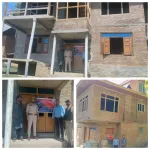Srinagar, Jan 05: The implementation of rural development programs in Jammu and Kashmir has seen mixed results with several initiatives aimed at to modernize and rehabilitate rural areas, delays and unutilized funds have hindered their full impact.
Officials document accessed by the Rising Kashmir revealed that despite substantial financial allocations under central schemes like DILRMP and WDC-PMKSY, progress remains slow, leaving vital projects incomplete.
Under the DILRMP, J&K received Rs. 27.02 crore for modernizing land records, yet only Rs. 16.43 crore has been utilized, leaving an unspent balance of Rs. 10.59 crore, it said.
The program, which aims to digitize cadastral maps and integrate them with Records of Rights (RoR), has seen slow progress due to insufficient infrastructure and a lack of skilled manpower.
While other states have accelerated these efforts, J&K remains behind, with only 22 districts seeing partial digitization. The gap in implementation not only delayed administrative efficiency but also limited transparency and ease of access for landowners across the UT.
Under the WDC-PMKSY, which focuses on rehabilitating degraded and rainfed lands, the first phase of the scheme (WDC-PMKSY 1.0) was completed nationwide in March 2022, with 99.91% of projects finalized. However, J&K struggled to complete six projects due to administrative challenges.
The second phase (WDC-PMKSY 2.0) sanctioned 1150 projects covering 5.05 million hectares across India, including J&K, with a total allocation of Rs. 8,134 crore. Yet, progress in J&K has been minimal, with funds either underutilized or delayed due to seasonal constraints and poor inter-departmental coordination.
One of the main concerns is the recurring issue of unspent funds in J&K’s rural development programs. In 2023-24, Rs. 834.68 crore allocated under WDC-PMKSY remained unused. Delays in fund release, lack of trained personnel, and the absence of real-time monitoring systems have slowed down the implementation of these schemes. Such inefficiencies have left many of the UT’s rainfed agricultural lands untreated, adversely affecting farmers and rural area dependent on these lands for their livelihoods.
The Parliamentary Committee on Rural Development has expressed concern over these delays and recommended immediate corrective measures. It has urged the administration in Jammu and Kashmir to strengthen its administrative machinery, streamline fund utilization processes, and leverage technology such as the SRISHTI geospatial portal to monitor project progress.







